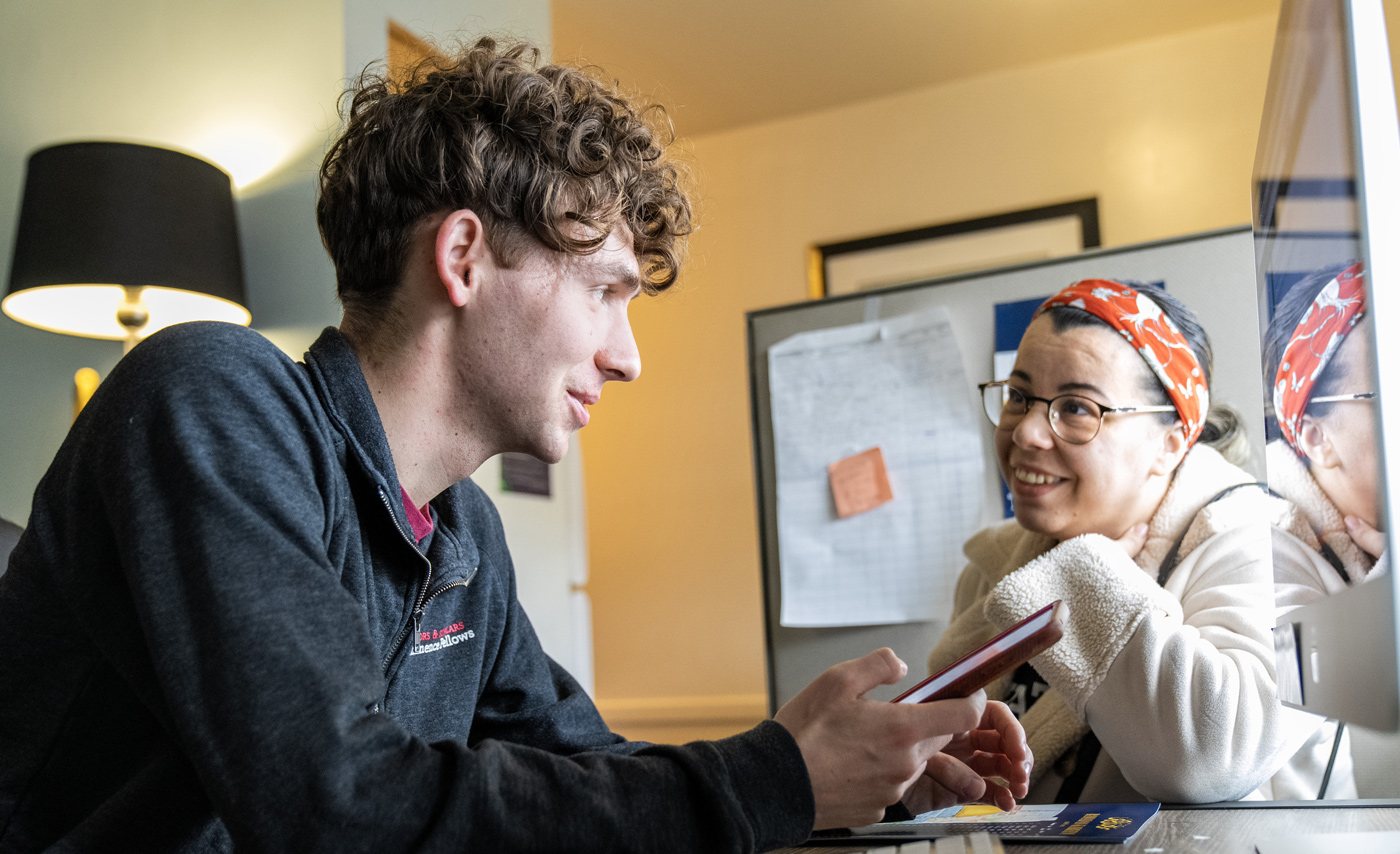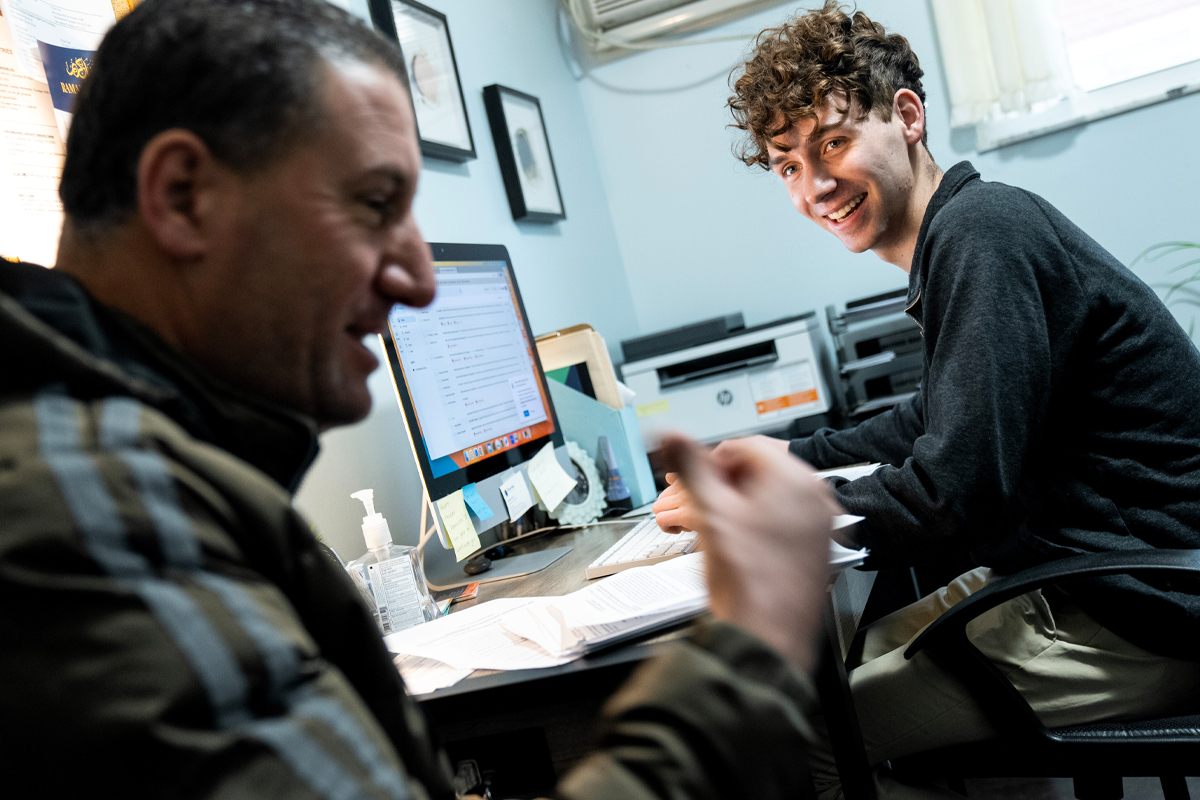Pursuing his passions, from Cairo to Columbus
Since coming to Ohio State, Larkin Cleland has studied abroad, started a nonprofit, taken on three majors and learned multiple languages.

When Larkin Cleland came to Ohio State from his hometown of Medina, Ohio, he knew he would be able to pick from a wide variety of majors and experience a taste of everything. In the time since, he has studied abroad, started a nonprofit, completed research projects, volunteered in Columbus, taken on three majors and learned multiple languages.
Throughout the wide variety of experiences he’s had while at Ohio State, one thing that remained important to Cleland was using his skills to solve problems and make a meaningful impact.
Thanks to Ohio State’s many course offerings, Cleland has been able to take on three majors that cover a variety of his interests: Geography, Arabic, and Islamic Studies. He is one of just a few students in the latter. “I have appreciated that because Ohio State is so big, there is everything under the sun and that we even have a department offering a major that small, and that I’ve gotten to take all these cool classes with three, four students,” he says.
Cleland’s affinity for learning languages connects his work in all three of his majors. After winning multiple language scholarships through the U.S. Department of State, he took part in many experiences abroad focused on learning Arabic and Persian. That included a fellowship with the American University in Cairo for a year of intensive Arabic study, for which he took a leave of absence from Ohio State in 2021.
While in Cairo, Cleland couldn’t help but notice patterns of gentrification that connected to what he was learning in his geography coursework. Since he had remained in contact with his research advisor, Mathew Coleman, even throughout his year away from Ohio State, Cleland proposed a new geography research project about gentrification in Cairo. It’s now a part of his senior thesis.
“[Cleland] is very hardworking and he’s very creative. He gets interested in something, he reads about it, he understands the key concepts, then turns concepts around so he can try to make a contribution.”
To collect data for his research, Cleland completed transect walks, a way to create maps by narrating a walk around an area and building annotated maps with notes and photos. This proved to be a challenge in the case of Cairo’s high surveillance, but Cleland came up with creative ways to get the data he needed, like through remote imagery.
Coleman says that Cleland’s internationally focused research is a major contribution to the literature on gentrification. “It’s really cool work. It’s exactly what I would expect from him,” Coleman says. “He’s very hardworking and he’s very creative. He gets interested in something, he reads about it, he understands the key concepts, then turns concepts around so he can try to make a contribution. I’ve seen him do this a number of different times and he’s doing it right now. He is blazing a new path with this project.”
Cleland wants to continue using his language skills after he graduates and already regularly volunteers at the Riverview International Center, a nonprofit that provides services for new Americans who mostly speak Arabic and French. “He makes an effort to supplement his Persian and Arabic language skills with area study experience,” Coleman says.

Turning a passion into community change
Another one of Cleland’s biggest contributions to the community has been through the SOAR Initiative, a harm-reduction nonprofit he and his peers in the Eminence Fellows Program founded during their freshman year (“SOAR” stands for “Safety. Outreach. Autonomy. Respect.”). When Cleland and other members of the cohort realized they were all passionate about working to fix the overdose crisis, they decided to commit to working with the Columbus community to find a solution.
“We had no idea what we were doing. A lot of it was that we happened to meet the right people out in the community, people who were already doing harm reduction work and had been for many years. Drawing on that, we did our own research,” Cleland says. “We met with tons of different people here in Columbus. We started volunteering at the syringe exchange, talked to people who use drugs, and eventually found some gaps in the response to the overdose crisis. We were like, ‘Well, we can fix this,’ and sort of founded a nonprofit off of that.”
The group sought out opportunities to observe and understand what was already being done in Columbus so that they could help create sustainable community change. “Throughout the second half of my freshman year into my sophomore year, we were all emailing anyone we could find and going to talk to them to see what they thought. People were doing ride-alongs with the EMS and we met with dozens of different people in public health, asking people what they thought solutions were,” Cleland says.
The SOAR Initiative now has 18 part-time employees and has embedded itself in harm reduction efforts across the entire state of Ohio. Cleland now sits on the executive board of the organization, along with many of the founding members, who have remained involved even after some have moved on from Ohio State. “We’re lucky that Eminence brings together a good group of people with different interests and skills, so our skills kind of complimented each other,” Cleland says.
Whether it’s in the classroom, on the streets of Columbus or in another country, Cleland’s time at Ohio State has allowed him to utilize his love of learning and passion for helping others to make an impact. “I like learning languages, that’s just something I like doing,” he says. “If I have some knowledge about the overdose crisis, I want to do something about it, so I’ll try to find a way. If I have that skill, I want to use it to do something. I don’t just want to have it, I want to use it to do something.”